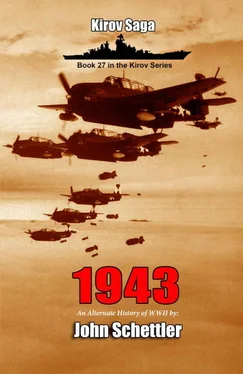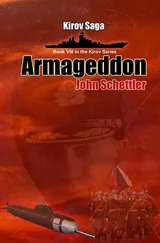“But I don’t see how,” said Karpov. “Yes, he was Deputy Director of the KGB for many years, but now he seems privy to events that no man on earth should be able to fathom. How it is he can claim to know what the long-term consequences of our presence here will be?”
“Perhaps he’s already seen it,” said Fedorov. “Frankly, I’m beginning to think he may not be from our own time line—not native to 2021, in spite of the fact that he had a long, distinguished life line in our time.”
“What? Then where in god’s name did the man come from—mars?”
“You don’t have to ask me that,” said Fedorov. “I think he may have come from a future time—beyond 2021. How else could he possess the insight he has? He knew about the effects of massive detonations on the time continuum, and he was deeply involved in the black operations that were masked by our nuclear test program. I think he may even have known about Tunguska. It’s clear that he’s been operating on many levels here, for on more than one occasion he’s told me that he holds the recollection of lives lived from more than one meridian of time.”
“Just like we do,” said Karpov. “You’ve got a few versions of yourself locked away up there, don’t you? As for me, the two lives I seem to have lived in this little adventure remain incarnate—one in my head, and one in my brother’s. I have no idea what my brother was doing three days before he went to see with Kirov . Oh, I can take a good guess, but I have no clear memory of that.” Karpov pointed to his head. “Not up here…. And my brother knows nothing of what we did the first encounter—at least he did not have this awareness the last time we spoke, and that was only yesterday. So while you and Volsky may be a salad bowl of different selves, my head is uncontaminated by these layers from other lives. Better that way. I think more clearly. Yet your theory holds some merit. Kamenski knows entirely too much—if the man is to be believed.”
“Why would he lie?”
“Lie? What exactly has he said, Fedorov? Just what is this great doom he warns about?”
“It obviously has to do with the ship—this ship. I suppose it did originate with the warning the Watch received from the future.”
“You’re speaking of this Fairchild woman now—the one on the converted British destroyer?”
“Correct. I can’t recall whether we’ve discussed it, but here’s the gist of things. When we first appeared, we ended up tangling with the Royal Navy—never a good idea, but you seemed to think you would prevail.”
“I would have beaten them easily enough.”
“Yes, with special warheads. Let’s not get into that now. What we do know is that Admiral Tovey’s experience in those encounters caused him to establish a secret group within the Royal Navy—the Watch. They were to look out for any further reappearance of our ship. Some of the original members were Tovey, Alan Turing, who was instrumental in concluding we were not from their own time, and other key Admirals like Cunningham and Fraser. I’m not aware of others. In any case. That group persisted into modern times—even in our own day. Fairchild was a member in our own time.”
“Indeed? How very strange. You realize what this means? If that is the case, then the British must have known…. Why, they must have known that Kirov would go missing in the Norwegian Sea—but how?”
“Now we get to the interesting part,” said Fedorov. “Fairchild claims they received messages while at sea. They were cryptic at first, and they came in over a series of time—intended to establish credibility on the part of the sender. One predicted the events of 9/11 for example. Another was data from the stock market received well before the given day, and the numbers tumbled into position when that day arrived—exactly.”
“Interesting. I suppose that’s just a bit like our telling these people here what they were about to do next.”
“Yes,” said Fedorov. “At least in the beginning. Now this war is so skewed that I can’t easily predict anything that might happen next.”
“Alright, Fairchild is a member of the Watch, and she gets messages from the future.”
“Correct—about us. In fact, they were warnings—beware a ship, beware Kirov . Then those future voices go silent.”
“Very dramatic,” said Karpov. “So now you think Kamenski may have been sent back somehow to reinforce that point. That’s the essence of his beef—beware Kirov .” He waved his hands in a mocking way. “And what I think this comes down to in the end is quite something else—beware Karpov. Isn’t that what Kamenski is really saying? After all, the ship is just a hunk of steel and other exotic materials. Without me, or someone else at the helm, it just sits there.”
“I suppose you have a point with that.”
“Of course I do. If you or Volsky were in command here, would Kamenski be all in a tither about it? No.”
“I would not be so sure about that,” said Fedorov. “After all, Volsky was in command all through the operations in the Med, and I was Captain as well. You were not in charge the first time we hit the Pacific. It wasn’t until you displaced after the Demon volcano that things got really warped.”
“Yes, and you and Volsky had to come chasing after me and spoil things. Did Kamenski put you up to that?”
“It was my doing—I’ll admit it. I convinced the Admiral that we had to intervene. But I did consult Kamenski, and he came with us on Kazan the first time.”
“Riding shotgun,” said Karpov. “Alright, what is this great doom Kamenski is worried about? Are we going to hatch another plan here to try and save the world? You saw how that worked out at Ilanskiy.”
“You heard the Admiral. Kamenski is convinced our contamination of the timeline here will be fatal if we remain. He wants all of us to return to our own time—you, me, the ship, Volsky on Kazan , Fairchild on Argos Fire , that Japanese destroyer, and all the rest. We must remove any contaminate from this meridian, or face the consequences.”
“What consequences? What did Kamenski say would happen?”
“I’m not certain. Volsky said he could feel it, almost like a man who senses the impending edge of an event that has not yet come to pass. But we should already know the danger we pose here. We both faced it once already—Paradox.”
“Yes,” said Karpov. “That was somewhat harrowing, but as you can see, the world did not end. Here we sit, Fedorov.”
“True, this world did not end, but it has been horribly twisted—Stalin dead, our homeland fragmented into three warring states, Ivan Volkov and Orenburg allied with Germany, Moscow burned. God only knows what else will happen before this war ends.”
“Yet you and I have gone over this time and again. I thought we had agreed that our only course was to win here—set things right with force of arms, not some arcane magic worked out on that back stairway at Ilanskiy. Now Volsky rises from the dead with another of these trumped-up crusades, this time spawned by Kamenski.”
“Well,” said Fedorov, “what if our theory is correct? What if Kamenski is from a time beyond our own? From that perspective, he could have seen the outcome of all these events.”
“Then why the cloak and dagger?” Karpov waved his hand. “Why all the melodrama? Why doesn’t the man just come out and make things plain?”
“Who knows? Maybe that would even make things worse. After all, we faced the same dilemma ourselves when we appeared here. Once the locals came to believe who we really were, they naturally wanted to learn what we know.”
“Yes,” said Karpov. “Who could resist looking into a magic mirror that would show him the future?”
Читать дальше












